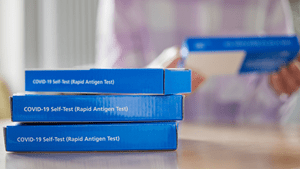
Over the last couple years, millions of COVID-19 test kits were mailed to homes and handed out at primary care offices across the United States and stashed in cupboards, drawers, and cabinets.
For some of those test kits, it may be time to toss them out. For others, they might be useful for a little longer. Roberto Vargas, MD, is the Executive Medical Director for Rochester Regional Health Pathology and Laboratory Medicine, and explains how to determine if a kit is expired, how expiration dates are set, and how to dispose of a kit if it is past its use date.
At-home tests are done using antigen or molecular testing. Antigen testing uses a sample to detect the presence of a specific viral antigen; molecular testing uses a sample to detect the genetic material of the virus. A positive result in either test indicates an infection.
Each test kit contains materials and instructions for a person to collect a sample – usually via a nasal swab or saliva specimen. The sample is then left to sit until results appear. With most at-home tests, this is within 10-20 minutes. Some tests require a second swab or sample within a certain amount of time to confirm the results.
“A positive result indicates a COVID-19 infection,” Dr. Vargas said. “A negative result needs to be confirmed with another antigen test, regardless of whether you are symptomatic or asymptomatic. Repeat the test within 48 hours to ensure the result is correct.”
Currently there are dozens of FDA-authorized at-home COVID-19 tests available for purchase. Most pharmacies and drug stores carry them over-the-counter at costs ranging from $8-30.
According to the CDC, each manufacturer is required to perform studies on how long after a test is manufactured it can be used and still show accurate results.
The expiration date indicates how long the reagents in a test kit can remain stable and continue to show a correct result. Every manufacturer performs continual testing to see if the shelf life of their test kits can be extended. In some cases, a test kit’s original expiration date can be extended.
The FDA keeps a list of every approved COVID diagnostic test, who can use it, and any extensions of expiration dates online.
COVID-19 test kits may not achieve the same level of accuracy if they are kept in very cold or very hot conditions for extended periods of time. If a kit is kept for several weeks in an environment that falls outside the recommended temperature storage range, it may not be optimal. The recommended storage temperature is listed in the instructions for each test.
“The reagents in the COVID-19 tests capture proteins that belong to the virus,” Dr. Vargas said. “As the test kits reach their expiration date, they become less efficient at capturing those proteins, leading to an increased rate of false negative test results. Once a test expires, it can be thrown out in the trash.”
Since FDA authorization allows most at-home COVID test kits to be sold over-the-counter, the kits can be found in pharmacies, supermarkets, and convenience stores.
To find a free COVID-19 test kit nearby, reach out to a community health clinic or a local public health department to see if there are any available.
